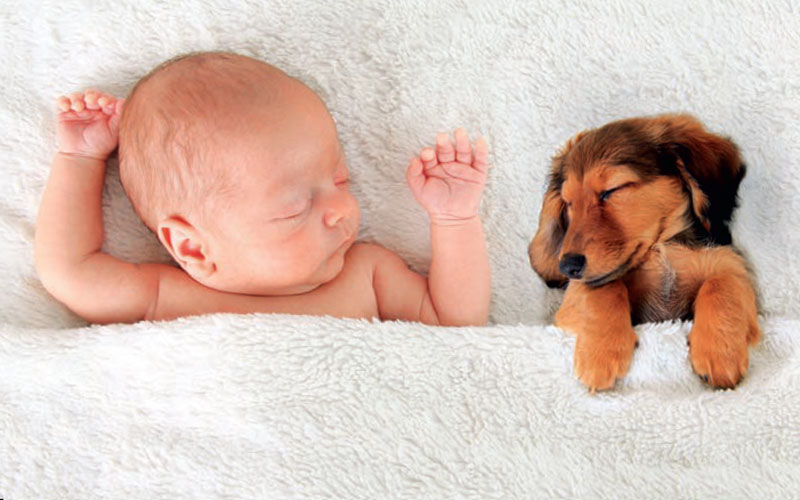The arrival of a baby can be an overwhelming experience for pets. Kristie Bradfield discovers why it is important to prepare the furry members of your family for the newcomer.
Little Ava Schlipalius will never be short of furry friends to play with as she grows up. “They are collectively known as the zoo,” says Ava’s father, James, of the three dogs, three cats, four horses, rabbit and dozen or so guinea pigs that share the family’s Margaret River property.
James and his family took time to plan for the inevitable interaction between Ava and her many pets, an undertaking that occurred over the space of several months, and this careful planning paid off. “We were delighted with Ava’s first experiences with the animals — the horses in particular,” James says. “All our pets seemed very relaxed. Meredith, my wife, has had a lot of rescues along the way as she is a vet nurse. With Ava, we think the animals were curious about what Mum brought home this time.”
While Ava’s experience was an overwhelmingly positive one, not all first meetings are. With a baby comes more noise and more visitors, changes to routines and changes in owner behaviour. So how do you help the top dog prepare for the new arrival?
Brush up on obedience
While bringing a baby home is a time of unbridled excitement, some pets have a tendency to ramp up the excite-o-meter and revert to undesirable behaviour. For these pets, it’s a good idea to brush up on some obedience skills. The ability to control a dog verbally in the presence of a young child is crucial. Skills such as sit, stay and down provide dogs with basic commands that direct behaviour. Rewarding good behaviour with treats helps establish a positive association between the command and the action.
If your dog hasn’t been through obedience training, or if you need a refresher, it’s a good idea to work with a trainer or behaviourist as soon as possible to get these skills under your belt.
When and where to start
The arrival of a baby brings with it significant changes in routine, so it’s a good idea to start on this early. “Change the routine well in advance of the arrival of your new baby,” says Perth-based animal behaviour expert Dr Kate Lindsey. “Consider how the daily routine will change including mealtimes, walks, access to particular parts of the home and the amount of attention your fur-baby will receive. Gradually introduce the new routine in the months leading up to your baby’s arrival.” Dr Kate also suggests creating a dog- or cat-free zone a few weeks prior to your baby’s arrival so your pet has time to adjust to the change in access and you have a safe space for your baby’s tummy time when needed. Meeting baby for the first time
Dr Kate says that if you are having your baby in hospital, it is a great idea to get your pet used to the baby’s smell before bringing baby home. “A swaddling cloth or piece of clothing that has been in contact with the baby’s skin is perfect to introduce foreign scents from the newborn to your pet,” she says.
Getting started
Dr Kate suggests that expectant parents pick up a copy of Lewis Kirkham’s book Tell Your Dog You’re Pregnant: An Essential Guide for Dog Owners Who Are Expecting a Baby. Described as “mandatory reading” by experts, the book contains practical advice about making the arrival of the new baby an easier transition for all.
*PETS always recommends supervising activity between children and animals.
For more pet advice and care tips, subscribe to PETS Magazine here.


Leave a Reply